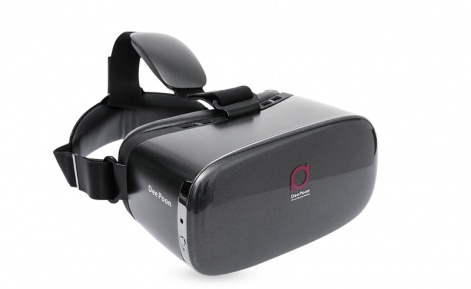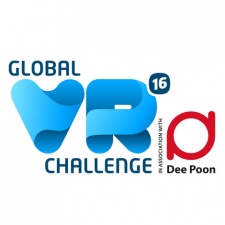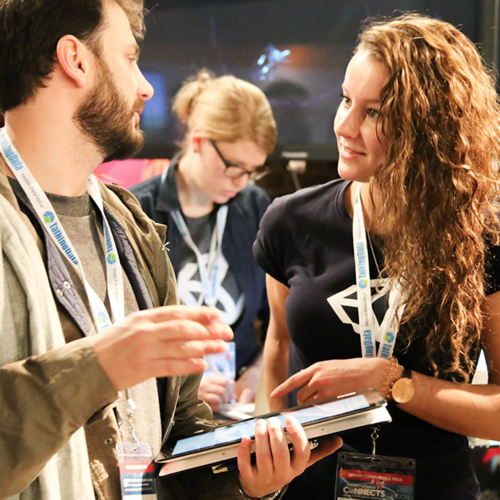The deadline for entry to the Global VR Challenge is midnight Monday, 20th June.
The contest will culminate at the ChinaJoy event in Shanghai on July 30th where the winner will be announced on the show floor.
You can find out how to enter your VR game or concept here.
To give more details about the Global VR Challenge, we spoke to the contest’s partner, Chinese mobile virtual reality outfit DeePoon’s chief strategy officer Leon Zhang, about the competition and the opportunities for VR developers in China.
PocketGamer.biz: Tell us a little about DeePoon. Where have you come from and what's your vision?
Leon Zhang: DeePoon was founded in June 2014, and is now two years old with more than 150 employees, among whom more than 90 employees are engineers.
Sunny Chen, founder and CEO of DeePoon, used to work for Intel and he was one of the first researchers for virtual reality in China since 2006.
I'm the chief strategy officer of DeePoon, and I used to work for ARM as head of APAC ecosystem, to build the Mali GPU ecosystem. Now the Mali GPU has become the number one mobile GPU IP in the world.
Tiehan LV, CTO of DeePoon, who has a Ph.D from Princeton University, used to work for Intel for more than 15 years as principal engineer. Our vision is to build the ultimate computer platform for everyone to make dreams come true.
You make a wide range of hardware; how many different units is it now?
DeePoon is the leading virtual reality company in China focusing on VR hardware and a VR content platform.
Our forecast is that VR device shipments in China will be more than 10 million.Leon Zhang
We have which the most complete product lines, including
- PC VR HMD (70 percent market share in China),
- Console VR HMD, Mobile VR Box (>500K units shipment so far), and
- standalone all-in-one Mobile VR (Samsung 2K OLED + Exynos 7420 with 19ms latency and mobile position tracking solution).
We also have the largest mobile VR content platform named 3D Bobo with more than four million registered users and more than 100,000 DAU in China.
Why did you get involved with the Global VR Challenge?
Content is critical for the virtual reality use case, and video and games are key use cases.
DeePoon is leading VR ecosystem in China. In 2015, DeePoon held the first China VR game developer competition and the first China 360-degree video competition.
For the first China VR game developer competition, there were more than 100 local game studios to submit the games, and finally the top ten VR games win.

In 2016, DeePoon hopes to find more outstanding VR game studios, and Europe is a great place where there are lots of the best game studios and developers. We would like to find them out and collaborate with them to win the market.
DeePoon is willing to act as a bridge for studios and developers to get to know the China market, get the funds, and win the Chinese market.
Can you explain more about the Chinese VR market?
VR is quite hot in China, though it is still new for lots of people who haven't tried it before. Our forecast is that VR device shipments in China will go beyond ten million, including PC VR, Mobile VR box and all-in-one Mobile VR, in 2016
People believe watching VR or 360-degree videos and playing VR games are major use cases for VR. However, today there is little good content available for VR.
It is very hard for foreign developers to bring their games directly to China, so the right partner can help.Leon Zhang
Almost all of China's game developers now care about VR, and some of them have started to develop VR games for PC VR and mobile VR. However, there is still space for developers to optimise their games for the best VR experience and find the right game type and style.
What sort of games and other content is successful in China at the moment?
It depends on if it's a PC VR game or a mobile VR game. We believe mobile VR is the top trend and it will have more users.
For the Chinese market, mobile VR will have a bigger chance and so will the games suited for mobile VR use cases, such as casual and social.
How quickly do you expect the market to grow?
I have no exact data, however, the trend is that mobile VR, including cardboard type, Gear VR type headsets and all-in-one standalone mobile VR, will get at least 100 percent, or even 200 percent growth year by year.
For technology perspective, the merge between virtual reality, augmented reality and AI will be the key trend. The success of VR isn't only VR technology, but the integration of multiple technologies.
What advice would you offer to VR developers right now?
My first advice for VR developers who want to enter Chinese market is to choose the right partner who can help the them understand the Chinese market and to do the right localisation and modifications.
In addition to the different user requirements, the Chinese game market has totally different rules and policies. It is very hard for foreign developers to bring their games directly to China, so the right partner can help them to resolve these risks.
Also, PC VR HMD in China is majorly for the professional market, not the end-user market.The professional market always requires the content has flexibility and is able to be customised.
It isn't easy for Western developers. If the developers are developing the games for end-users, mobile VR may be more reasonable platform to target.
You can find out about the Global VR Challenge here.













